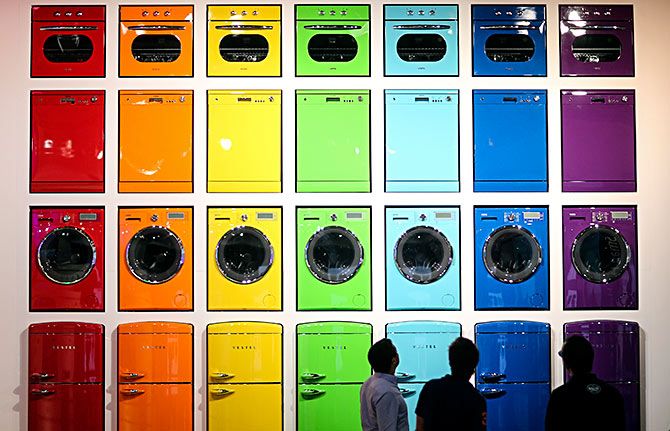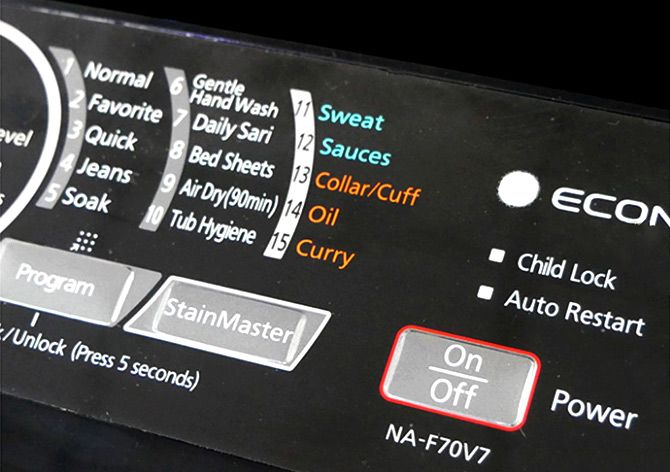LG and Panasonic are looking to revive their fortunes in India by building local insights into their new products.

Japanese multinational Panasonic launched a washing machine with a “curry button” for the Indian market last month.
For a fringe player in the Rs 145-billion washing machine market in India, its new product is a classic case of customisation designed to position itself as a problem solver and appeal afresh to consumers.
According to the company, it has over five per cent market share in the segment, and aims to double it to 10 per cent in 2017-18.
Gaurav Minocha, head, home appliances, Panasonic India, says the new “StainMaster washing machine” was developed after conducting extensive research and development for over two years on the ingredients that go into curries throughout India.
“It was a response to high demand from consumers finding it difficult to eliminate tough stains. Panasonic’s global as well as Indian teams studied the lifestyles of locals to understand consumer needs and behaviour for the launch of this model.
"As part of the development, we analysed what went into a typical Indian household curry and tried different combinations of water temperature and flow to remove stains including traces of hair oil.”

Since its entry into the market, the new model has sold 5,000 units in the first two months and the company aims to sell 30,000 units in this fiscal. Panasonic has planned similar machines for other parts of Asia to tackle stains specific to the countries.
India is a very diverse market and it has become imperative for brands to innovate and make products keeping in mind the needs of locals, points out Minocha.
“We have learned that the products which work well in the international markets might not work for Indians. As the market is also changing at a fast space, we constantly innovate and reinvent ourselves with a greater focus on technology and consistency in our outcomes. Aligning ourselves with the government as well as the industry, Panasonic is working towards making India a strategic hub and presenting an opportunity to maximise localisation.”
Similarly, in the consumer durables space, South Korean major LG recently claimed to be the first manufacturer to shift its entire line of split air-conditioners to inverter ACs. Last month, the company formally launched its dual inverter AC series priced between Rs 34,000 and Rs 54,000, about 12-15 per cent higher than split ACs.
Vijay Babu, LG India business head, AC, says, “For the last six months, the star ratings under inverters were going up, because customers were thinking there is huge savings in them. Also, the Bureau of Energy Efficiency (under the power ministry) has been promoting energy efficiency. So, in this period the overall consumer behaviour veered more towards energy-efficient products. So we felt, why not make the transition?”
He adds that with the government planning to strictly enforce the Indian Seasonal Energy Efficiency Ratio -- a new star rating for ACs -- from January 2018, LG sought to be a first mover.
“If you are driving a car in heavy traffic, you tend to start and halt repeatedly whereas in an express highway you only change your speed, and so your fuel consumption will be less. That is the major difference between on-off ACs and inverter ACs. So, keeping in mind government plans, we took it up as a challenge.”
With the new series of ACs promising to cool up to a temperature of 52 degree Celsius, LG has been able to introduce them globally after the India launch in other tropical regions, thereby making huge savings in research and development.
Babu argues that for a 1.5-ton dual inverter AC, a customer can recover the higher price compared to other ACs by saving up to 1,000-odd units annually. Quoting market research firm GFK, he says since the introduction of the product in December 2016, LG’s share in the inverter AC segment has risen from 19 per cent to 33.5 per cent last month. “Once you give a good product to the consumer, it's not a question of what price you are charging,” he adds.
Industry experts believe customisation across categories is only going to increase in future as companies make strong attempts to differentiate at a time products are becoming increasingly generic.
N Chandramouli, CEO of Trust Research Advisory, cautions, “Over-customisation is a problem, because if you do so you will have to have that many stock-keeping units, therefore standardisation of manufacturing assembly line becomes a bit of a difficulty. Nevertheless, customisation is always a welcome move to address a target audience and it makes buyers keener.”
While companies are always on the lookout for customisation, doing so for products which are utilitarian are all the more challenging and necessary.
Abdul Majeed, partner at PwC India, says in the automobile sector every manufacturer tends to customise vehicles built in India for consumers here, keeping in consideration local sensibilities around family (hence, the thrust on space), legroom and boot space, comfort for the elderly and modifications of the headlamps in view of poor road lighting, etc.
“But going forward, we expect more customisation in the sense more manufacturers will look at the customer type — female, male, age group — rural, urban markets, etc in order to meet customer aspirations of different categories.”












 © 2025
© 2025